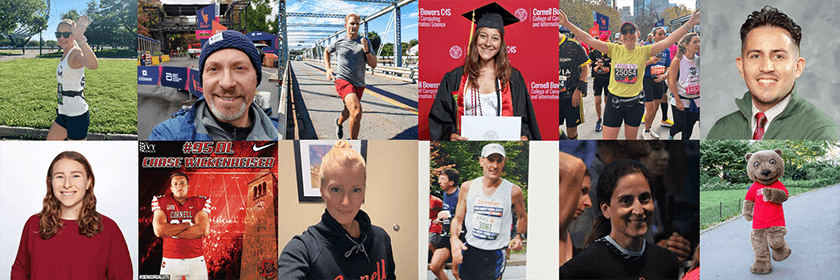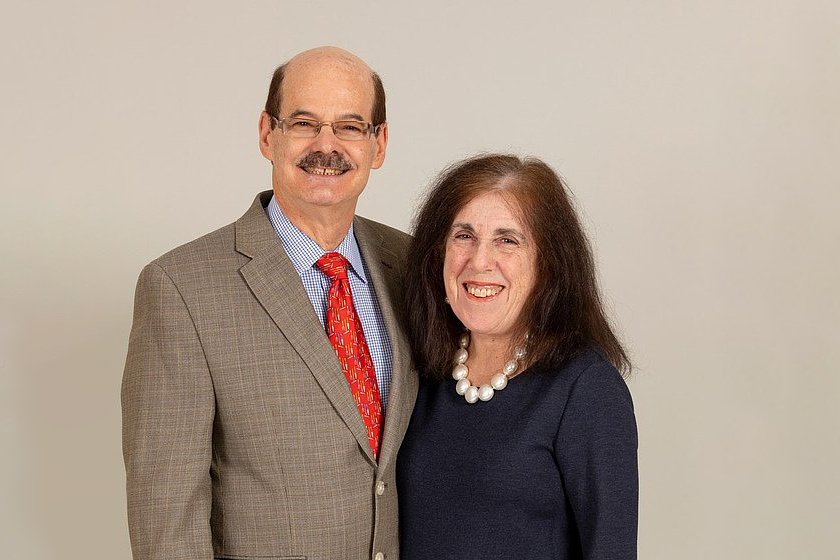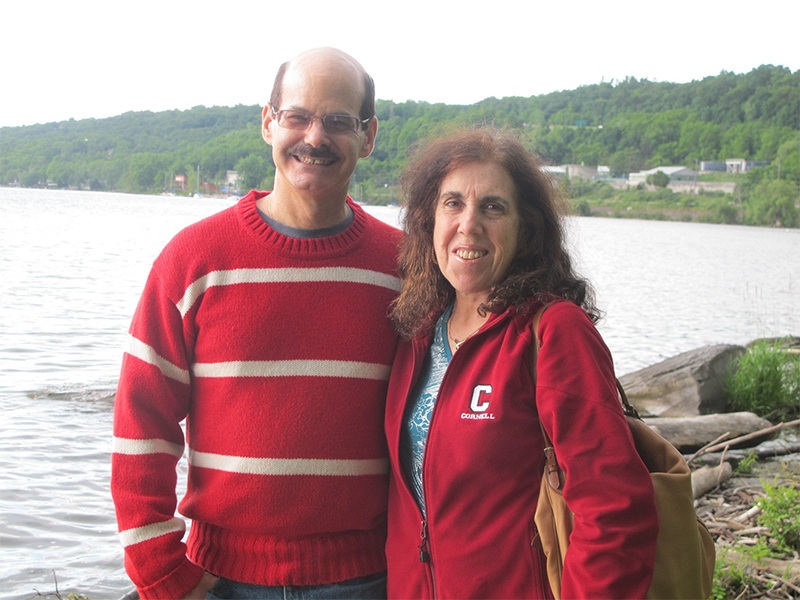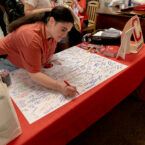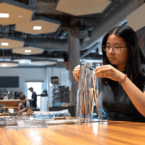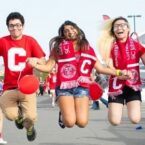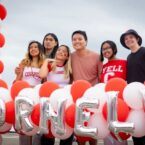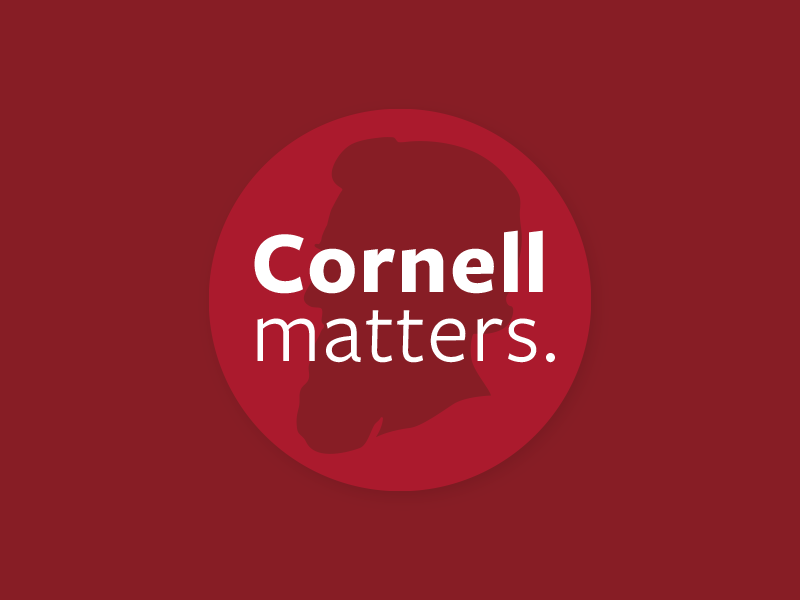Lindsay Forness ’84 sat down with volunteer Jordan Harrod ’18, to learn more about Jordan’s Cornell experience, her career, and how she stays connected to the university.
Jordan’s alumni activities and positions:
- Class of 2018
- Co-President (2019-present)
- Vice President (2018-2019)
Lindsay Forness ’84: Cornell is a big place. What did you consider your communities and how did you find your corner of the university?
Jordan Harrod ’18: I think that my first community was with people who lived in Dickson my freshman year. My closest friends are people who lived in that hall with me and experienced the transition to Cornell with me—even with different majors.
After that, Biomedical Engineering (BME) because I was part of the first class of BME at Cornell—only 19 students. We were a lot closer because we worked pretty close with the department to give them feedback on courses and help them figure out a long term trajectory for the program. We still have a GroupChat that is a relic of our time at Cornell.
What is the tie that binds you to the university?
My Dad is an alum, so I spent a lot of time on campus growing up. In spite of that, I actually didn’t want to go to Cornell. I thought that I’d “carve my own path” instead. But I toured campus about a week before the early decision deadline, and it was the first place where I really loved the community, and the feeling of being there, and the overall environment. And I think that was one of the things that convinced me to apply early decision at the last minute. It started when I was a kid and never left.
What was it like as a member of your communities, as a member of the Class of 2018?
It was an interesting four years, from a political sense. We had kind of a political awakening while I was there, which was interesting for me. There was a lot of identity-related stuff. I hadn’t contextualized myself in the wider world until I got to Cornell—to college—and started paying attention to things like the news and larger issues that were going on in our country and the world. Part of it has to do with how I grew up. I had a lot of opportunities growing up, and did not have to worry about a lot of stuff. Cornell gave me the opportunity to take a step back and see where I fit into the world. I don’t know that it changed my trajectory—but it is part of why I got involved in science policy work. I think there were definitely experiences that shaped my view of the world and how others in my communities interacted with the world.
Have you connected with CBAA? Either as a student or as an alum?
As a member of the Class of 2018 Council, we reached out to CBAA last summer—we had a leadership change in our class—so I’m still picking up conversation threads. I have attended a few CBAA events like the recent leadership conference where I hopped into some sessions. Cornell MOSAIC is something I’d like to get a little more involved in once I figure out the Cornell alumni landscape a bit and figure out what I can make time for. I’d also like to get involved with the BME department as an alum.
Where is your fave place on campus?
I have a love/hate relationship with most of the engineering quad. And this is not necessarily a place, but morning runs from West Campus to the Vet School and back along Tower Road. The whole run—the greenery—all the different parts of campus, the loop around the lake. The greenery and outdoor stuff is what I miss most about Cornell, now that I’m living in Cambridge, MA.
What is your advice to someone who wants to get more engaged with the university?
I would definitely say reach out to your Class Council. We are always interested in hearing from classmates, and in the era of social media it feels like you can always be in touch, but as a Class Council we wonder what we can provide you since you already have social media as a resource to stay in touch with Cornell friends. Connect through affinity groups, or the Cornell Club in your area. I reached out to the CC of Boston—they are super nice and have some great events. In my experience, people are always interested in finding a way to help you get involved.
Who has inspired you, mentored you, who do you look up to?
My Dad, Tim Harrod ’84 always said “Ask for what you want. The worst they could say is no.” A big part of a lot of the opportunities I could participate in is signing up, looking at programs.
When I came to Cornell, I originally thought I wanted to pursue an MD/PhD. I was lucky to have already had research experience during high school under Dr. Helen Lu at Columbia, who I was introduced to via my godfather, Dr. Dennis Mitchell ‘84, and ended up working with Dr. Lawrence Bonassar (BME) and Dr. Lara Estroff (MSE) after my freshman year. I ended up working on a project that looks at a meniscal attachment in the knee, which helped me learn a lot about biomaterials, medical image analysis, and orthopedic tissue engineering in general. I also learned a ton about what actually doing research is like on a day-to-day basis, which helped me decide whether I wanted to pursue a PhD, and about how to present research well. Working with two labs helped me understand the different audiences you might have to speak to.
Dr. Chris Schaffer (BME) was definitely the person who got me into science policy, and was generally just a great mentor as an undergrad. I took his class on instrumentation, which I ended up TAing the next year, and that was what got me into the electrical engineering side of things. What I liked about that class was that it was very hands-on, and a lot of the stuff we learned was basic circuits, but he wouldn’t necessarily teach it to you, he would hand you materials and tell you the result he wanted. You would have to figure it out yourself, and then at the end of class, he’d be like, that was Ohm’s Law, or something super straightforward, but now you’ve reasoned out in your head whatever way makes sense to you how that works.
He was definitely a great person to talk to for things that weren’t pure research, things that were more like “I want to do a PhD, but I also want to be in public engagement.” He also taught me to teach well, when I was a TA, and was my advisor for our senior design project. He gave us a lot of latitude to pursue our own interests on that project, and he was just a great mentor for the last two or two and a half years of my undergrad. My research advisors and Dr. Chris Schaffer were the three people who really helped get me from freshman year to where I am now.
I also did some Computer Science coursework, with a concentration in Electrical Engineering and CS/machine learning. I do wish I had taken some business courses, now that I have an LLC! It covers work that I do outside of my PhD—making videos on YouTube, honoraria for non-academic talks that I give, and writing for Forbes. It’s a business shield to keep the work, intellectual property, and income separate. I was put in touch with Frank DeCosta, Ph.D. ’85—he was the first person I talked to about business formation.
What are you doing with YouTube?
I talk about the ways we interact with AI on a day-to-day basis. The channel started as a crash course for lay people in AI and algorithms and things that are generally overhyped, and has turned into a bit more of: here’s stuff that I think is interesting, might not be aware of, might be misunderstood, when it comes to algorithms or AI. It might not be day-to-day encounters, but it’s interesting.
How are people finding your videos?
When you post videos, the YouTube algorithm promotes them, so people can find them that way. I also work with an agency for my sponsorships, and being in the agency, you get promo’ed by other people in the agency. We have a platform called Nebula and whenever we run sponsor spots for Nebula in partnership with CuriosityStream, you usually feature other people’s work on it, and anyone who joins Nebula will come across my work. Another big one is Twitter. YouTube is my biggest social media following with just over 64,000 subscribers, and Twitter is my second biggest with a little over 11,000 followers, although I’m hoping to start making more content for Instagram and Tiktok this year too.
How do you decide how often you develop new content for YouTube?
I’m on a weekly schedule right now. I’m currently in the process of refiguring my production pipeline so that I do less work and hire people to do the work for me, which will make it a lot easier to do once-weekly videos.
What’s the first thing you’re going to do when it’s easier to travel?
Ooh, let’s see. One of them will probably be to go on a real vacation. It’s been an interesting year in the sense that YouTube got a lot bigger, I formed the LLC, my PhD has been going well, so I’ve been putting in a lot of work but haven’t taken a real break. Or I try to take a break from one my jobs and end up spending the “vacation” catching up on a backlog that had formed when I was working on PhD stuff. So I want to take a break that’s like, leave your laptop here and get on a plane and go somewhere and don’t check your emails.

